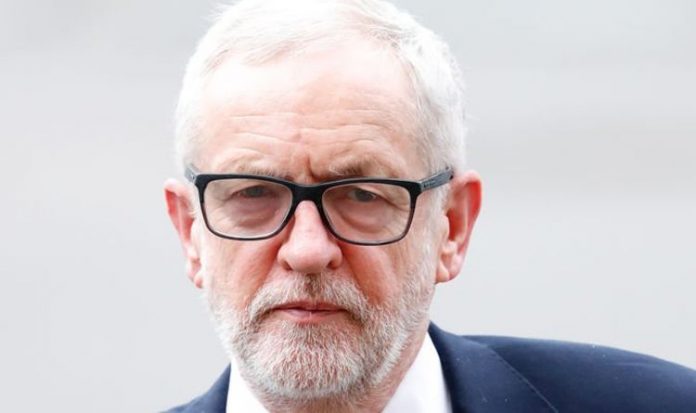Labour leader Sir Keir Starmer has withdrawn the whip from his predecessor Jeremy Corbyn in an unprecedented move today. The BBC’s Lewis Goodall dubbed it an “extraordinary moment” and tweeted: “I cannot think of any kind of parallel. “The man who was leader of the Labour Party in April, who Labour was putting forward as Prime Minister in December, who Keir Starmer described recently as a ‘a friend’ is no longer a Labour MP.”
Explaining the sudden move, a Labour spokesperson said: “In light of his comments made today and his failure to retract them subsequently, the Labour Party has suspended Jeremy Corbyn pending investigation.
“He has also had the whip removed by the Parliamentary Labour Party.”
In response to the Equality and Human Rights Commission’s report, Mr Corbyn insisted earlier today that he was not “part of the problem” when it came to Labour’s handling of antisemitism.
He said: “The number of cases in the public perception had become overstated.
“The existence of the problem I fully acknowledge which is why I took action to end the problem in the party by introducing a process to get antisemites out of the party.”

Jeremy Corbyn has just been suspended from the Labour Party (Image: Getty)

Corbyn and his successor Sir Keir Starmer (L) (Image: Getty)
Mr Corbyn was an incredibly divisive leader, both in and outside the Labour Party, during his five years at the helm.
He was considered a far-left backbencher due to his decades in the Commons, during which he defied his party’s whip more than 400 times, and so his election stunned many loyal Labour supporters.
His leadership election was also based on the new system where one member had one vote.
This put MPs on the same footing as Labour members, while the wider public could also register to vote by paying just £3.
The BBC’s Steve Richards claimed in a 2016 podcast, ‘The Corbyn Story’, that his election was “wholly unexpected and sensational”.
READ MORE: Boris Johnson snub: Why ‘Burnham could be in first PM term by now’

Sir Keir vowed to take a strong stance on antisemitism within the Labour Party (Image: Getty)
He had been elevated to a “political rockstar” status by appealing to a new audience.
Former Labour MP and current independent, Mike Gapes told the BBC: “It was a completely new electoral system, which was untested and when Ed Miliband decided that you could join the party right up until the vote, virtually, and even just pay £3 for the privilege of doing it.
“No one envisioned this outcome.
“Clearly a lot of people came in to vote in that election who were not party members.
“Some of them members of other parties.”
However, he said this was not the reason Mr Corbyn won — he said that it was the support he had drummed up from younger audiences up and down the country.
DON’T MISS
How Keir Starmer pinpointed Labour’s key failure over Boris Johnson [INSIGHT]
Labour shambles: Rebecca Long-Bailey’s NHS contradictions exposed [EXPOSED]
How Corbyn’s support for Bercow ‘has done Labour no favours’

Corbyn has vowed to “strongly contested” the suspension (Image: Getty)

Corbyn’s key Labour Party policies did not win him the election last December (Image: Express.co.uk)
It was this body of so-called ‘Corbynistas’ from outside Labour’s traditional members that held him up during his turbulent five years as Labour leader — even after he was repeatedly asked to resign.
There was a vote of no confidence in Mr Corbyn’s leadership, of 172 votes to 40, in 2016, only a year after he was first elected.
However, thousands of demonstrators were quick to gather to defend the Labour leader, and he responded with a statement that the MPs motion had no “constitutional legitimacy”.
He was even encouraged to resign by his predecessor, Ed Miliband, and his deputy Tom Watson, but he refused.
Mr Corbyn was criticised again and again over the next few years, particularly for his indecisiveness over the EU referendum.
However, the pivotal moment of his time as the leader arrived after he lost the general election last year.
Labour gained only one seat and saw major losses in former party strongholds, especially in the Red Wall of support across Wales and northern England.
The party collectively saw the lowest level of support since 1935.
Still, Mr Corbyn then announced that he would be staying in the role for a period of “reflection”, while many raged behind the scenes that he should have resigned immediately upon hearing the election result.
Former MP Phil Wilson who lost Tony Blair’s seat of Sedgefield said at the time: “I genuinely believe that the Corbyn leadership is the issue in this election and to say that it isn’t is delusional.”
Mr Corbyn stepped down in April, and made way for the newly-elected more centrist figure, Sir Keir Starmer — who has just drawn a line in the sand against his predecessor through his suspension.







